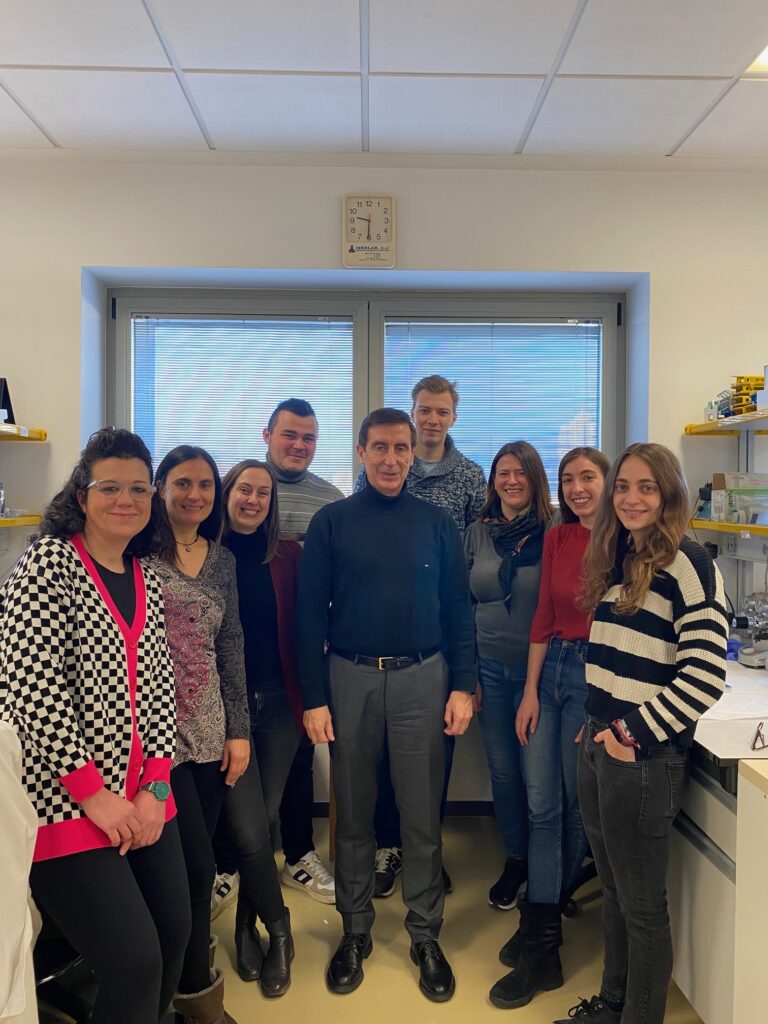El sábado día 4 de febrero se celebra el Día Internacional del Cáncer 2023. Esta efeméride tiene como objetivo aumentar la concienciación y movilizar a la sociedad para avanzar en la prevención y control de esta enfermedad. Fue promovida por La Organización Mundial de la Salud, el Centro Internacional de Investigaciones sobre el Cáncer (CIIC) y la Unión Internacional contra el Cáncer (UICC).
Desde la Sociedad Española de Farmacología nos unimos en la promocion de la concienciación social, presentado a alguno de los grupos que centran su actividad investigadora en la búsquda de nuevas estratégias terapéuticas para luchar contra esta enfermedad.
Presentación del grupo
El grupo de investigación «Neurodeath» pertenece a la Universidad de Castilla-La Mancha y está ubicado en la Facultad de Medicina de Albacete. Está dirigido por el Prof. Valentín Ceña y, en la actualidad, está integrado por dos científicos senior, dos contratados postdoctorales, dos estudiantes de doctorado y dos técnicos.
¿Cuál es la línea/s líneas de investigación que sigue el grupo?
La principal línea de investigación se centra en el uso de nanopartículas y siRNA para disminuir los niveles de proteínas involucradas en la fisiopatología de enfermedades neurodegenerativas y cáncer tanto in vitro como in vivo. Mas concretamente, el grupo está interesado en desarrollar nanopartículas que puedan transportar siRNA al interior de células de glioblastoma y cáncer de próstata para potenciar el efecto terapéutico de los medicamentos contra el cáncer.
Principales contribuciones
El grupo ha identificado varias nanopartículas que son capaces de transportar siRNA de manera eficiente al interior de células tumorales y de reducir simultáneamente los nivel celulares de hasta tres proteínas involucradas en la señalización de las vías de supervivencia y proliferación tanto en células de glioblastoma como de cáncer de próstata. Además, ha demostrado que algunas de estas nanopartículas son capaces de transportar siRNA marcado al cerebro.
Últimos trabajos publicados
1. MANZANARES, D. and CEÑA, V. Endocytosis: The nanoparticle and submicron nanocompounds gateway into the cell. Pharmaceutics 12: 656. 2020. doi: 10.3390/pharmaceutics12040371
2. MIGNANI, S.; SHI, X.; CEÑA, V and MAJORAL, J.P. Dendrimer–and polymeric nanoparticle–aptamer bioconjugates as nonviral delivery systems: a new approach in medicine. Drug Discov. Today 25:1065-1073. 2020. doi: 10.1016/j.drudis.2020.03.009.
3. MARTIN-MORENO, A.; JIMENEZ BLANCO, J.L.; MOSHER, J.; SWNSON, D.R.; GARCÍA FERNANDEZ, J.M.; SHARMA, A. CEÑA, V. and MUÑOZ-FERNANDEZ, M.A. Nanoparticle-Delivered HIV Peptides to Dendritic Cells a Promising Approach to Generate a Therapeutic Vaccine. Pharmaceutics. 12: E656. 2020. doi:10.3390/pharmaceutics12070656.
4. MIGNANI, S.; SHI, X.; RODRIGUES, J.; ROY, R.; MUÑOZ-FERNANDEZ, M.A.; CEÑA, V. and MAJORAL, J-P. Dendrimers toward Translational Nanotherapeutics: Concise Key Step Analysis. Bioconjugate Chem. 31: 2060–2071. 2020. doi: 10.1021/acs.bioconjchem.0c00395
5. GALLEGO-YERGA, L and CEÑA. V. Nanoparticle-mediated therapeutic compounds delivery to glioblastoma. Expert. Opin. Drug Deliv. 17: 1597-1613. 2020. doi.org/10.1080/17425247.2020.1810015
6. SOROLLA, A.; SOROLLA, M.A.; WANG, E. and CEÑA, V. Peptides, proteins and nanotechnology: a promising synergy for breast cancer targeting and treatment. Expert Opin. Drug Deliv. 2020 Sep 11:1-17. doi: 10.1080/17425247.2020.1814733.
7. CARBAJO-GORDILLO, A.I.; JIMENEZ BLANCO, J.L.; BENITO, J.M., LANA, H.; MARCELO, G.; DI GIORGIO, C.; PRZYBYLSKI, C.; HINOU, H.; CEÑA, V.; ORTIZ MELLET, C. MENDICUTI, F.; TROS DE ILARDUYA, C. and GARCIA FENANDEZ, J.M. Click Synthesis of Size- and Shape-Tunable Star Polymers with Functional Macrocyclic Cores for Synergistic DNA Complexation and Delivery. Biomacromolecules. 2020 Oct 21. doi: 10.1021/acs.biomac.0c01283. Online ahead of print.
8. MANZANARES, D. and CEÑA, V. Cyclodextrin-based nanostructure efficiently delivers siRNA to glioblastoma cells preferentially via micropinocytosis. Int. J. Mol. Sci. 2020. 21 (23), 9306. doi: 10.3390/ijms21239306
9. GALLEGO-YERGA, L.; DE LA TORRE, C.; SANSONE, F.; CASNATI, A.; ORTIZ MELLET, C.; GARCIA FERNANDEZ, J.M. and CEÑA, V. Synthesis, self-assembly and anticancer drug encapsulation and delivery properties of cyclodextrin-based giant amphiphiles. Carbohydr Polym. 252:117135. 2021. doi: 10.1016/j.carbpol.2020.117135.
10. MIGNANI, S.; SHI, X.; CEÑA, V.; RODRIGUES, J.; TOMAS, H..; and MAJORAL, J-P. Engineered non-invasive functionalized dendrimer/dendron-entrapped/complexed gold nanoparticles as a novel class of theranostic (radio)pharmaceuticals in cancer therapy. J Control Release. 2021 4;332:346-366. doi: 10.1016/j.jconrel.2021.03.003.
11. MIGNANI, S.; SHI, X.; CEÑA, V.; SCHARBIN, D.; BRYSZEWSKA, M.; and MAJORAL, J-P In vivo therapeutic applications of phosphorus dendrimers: state of the art. Drug Discov Today. 2021. 26(3):677-689. doi: 10.1016/j.drudis.2020.11.034.
12. SAROWAR, S.; CIRILO, D.; JÁTIVA, P.; NILSEN, M.H.; OTRANAGE, S.A.; HEGGDAL, J.; SELHEIM, F.; CEÑA, V.; BJØRSVIK, H.R.; ENGER, P.Ø. The Styryl Benzoic Acid Derivative DC10 Potentiates Radiotherapy by Targeting the xCT-Glutathione Axis. Front Oncol. 2022. 12:786739. doi: 10.3389/fonc.2022.786739.
13. POSADAS, I.; ROMERO-CASTILLO, L.; RONCA, R.A.; KARPUS, A.; MIGNANI, S.; MAJORAL, J.P.; MUÑOZ-FERNANDEZ, M.A.; and CEÑA, V. Engineered Neutral Phosphorous Dendrimers Protect Mouse Cortical Neurons and Brain Organoids from Excitotoxic Death. Int J Mol Sci. 2022. 23(8):4391. doi: 10.3390/ijms23084391.
14. PÉREZ-CARRIÓN, M.D.; POSADAS, I.; SOLERA, J.; CEÑA, V. LRRK2 and Proteostasis in Parkinson’s Disease. Int J Mol Sci. 2022. 23(12):6808. doi: 10.3390/ijms23126808.
15. DE LA TORRE, C.; JÁTIVA, P.; POSDAS, I.; MANZANARES, D.; JIMENEZ BLANCO, J.L.; ORTIZ MELLET, C.; GARCÍA FERNÁNDEZ, J.M.; and CEÑA, V. A β-Cyclodextrin-Based Nanoparticle with Very High Transfection Efficiency Unveils siRNA-Activated TLR3 Responses in Human Prostate Cancer Cells. Pharmaceutics. 2022 Nov 9;14(11):2424. doi: 10.3390/pharmaceutics14112424.


